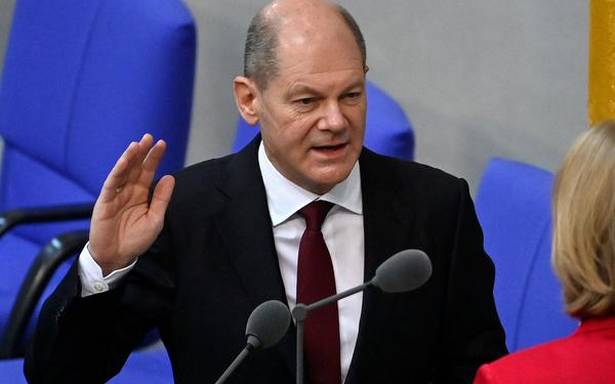On Wednesday, Olaf Scholz will be sworn in as Germany’s new chancellor, leading a center-left coalition aimed at making Europe’s largest economy greener and fairer.
Angela Merkel will leave office at 3 p.m. local time on Wednesday, marking the end of an era for Germans after 16 years in power.
All eyes are now on Olaf Scholz, the new chancellor, who leads a coalition of Social Democrats, Greens, and the liberal FDP. Scholz was a former German finance minister and vice-chancellor under Merkel.
- German president says Kabul airport chaos ‘shameful for the West’
- Briton suspected of spying for Russia arrested in Germany
Scholz, according to FRANCE 24’s Nick Spicer in Berlin, comes in with a whole policy that includes dealing with the Covid-19 epidemic, as Germany considers further limits to halt the spread of the Omicron form.
“Germany is in the fourth wave, and they’re considering making vaccines mandatory, which has sparked a lot of debate,” Spicer says.
The new government’s coalition agreement, titled, “Dare more progress”, includes a raft of measures designed to make the country more progressive and greener while also remaining competitive.
With pro-business FDP leader Christian Lindner getting the finance portfolio, there will also be a focus on balanced budgets. The challenge, Spicer says, is “how do you deliver on all these promises and not go into debt or borrow too much – it’s going to be a tightrope.”
Following are some of the main points of the new government’s roadmap for Germany:
No new debt
Germany’s no-new-debt rule had been suspended in the coronavirus pandemic, allowing the government to borrow billions to finance its way out of the crisis.
But the country’s next government – known as a “traffic-light” coalition because of the parties’ red, green and yellow colours – plans a return to the rule that is anchored in the German constitution.
In their agreement, they pledged to reinstate the so-called debt brake by 2023.
Maintaining the debt brake was a must for the FDP, and Social Democrat Finance Minister Scholz – who will now be Germany’s chancellor – has also long been an advocate of the rule.
The parties also agreed to not raise taxes during their mandate, according to a tweet by Lindner – a win for his party which has refused to raise any fiscal pressure on taxpayers.
Minimum wage, housing, vote at 16
In return, the Social Democrats secured their electoral promise of raising the minimum wage to €12 ($14) from the current €9.60.
To keep housing affordable, the coalition agreed to build 400,000 new homes a year, including 100,000 using public funds. A cap will be introduced on rental hikes, limiting any increases to a maximum 11 percent in three years.
The three-party combo also agreed to lower the voting age to 16 – something likely to favour the Greens and FDP, which have younger supporters than Merkel’s conservatives, who are largely backed by Germany’s army of pensioners.
Climate
The Greens’ main win came in the form of an accelerated exit from coal energy, which is to be brought forward by eight years to 2030.
The parties also agreed to “further develop” the country’s current climate protection law in 2022, and to “bring about all necessary laws, regulations and measures” on this front.
The expansion of sustainable energy will be “drastically accelerated and all hurdles and obstacles will be removed”, with the goal of ensuring that sustainable energy will make up 80 percent of the country’s mix by 2030.
With an eye on Germany’s powerful automotive industry, the parties agreed to put 15 million purely electric cars on the road by 2030, up from just over 500,000 currently.
Combustion engine vehicles will no longer receive approval from 2035.
Sovereign Europe
The parties emphatically say they “want to increase Europe’s strategic sovereignty” – likely to please the continent’s second biggest power France, which has made this a priority of its EU presidency beginning in 2022.
But the transatlantic relationship will remain a “central pillar” for Germany, and NATO is an “indispensable element” for the country’s security, the text says.
And potentially grating to Poland or Hungary, the parties want “an EU which protects its values and rule of law internally and externally”.
Presenting the coalition deal, Annalena Baerbock, the co-leader of the Greens who will take on the role of foreign minister, promised to put human rights back at the centre of German diplomacy and advocated more firmness towards Russia and China.
Legalise cannabis
Recreational use of cannabis will be legalised under the new government, making Germany one of only a handful of countries worldwide to do so.
“We will introduce the controlled distribution to adults for consumption purposes in licensed stores,” the parties say in the document.
“This will control the quality, prevent the circulation of contaminated substances and ensure the protection of minors.”
Migration
The coalition also aims to liberalise migration and citizenship rules, moves long resisted by Merkel’s conservatives.
Migrants who currently are merely “tolerated” in Germany – allowed to stay but without the right to work – would be given a procedure to gain formal residence permits.
Moreover the right to dual citizenship would be expanded and foreign citizens would have a quicker path to become German, in the case of “particular achievements in integration” in as few as three years of residency.
Abortion
The parties have pledged to abolish paragraph 219a, a controversial piece of Nazi-era legislation that makes it illegal to “advertise” abortion services.
“Doctors should be able to provide public information about abortions without fear of prosecution,” they say in the document.





